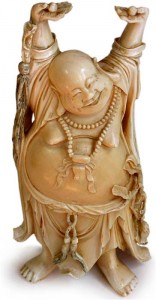Happiness, The Great Illusion
 Most of us have been raised on various stories that end in “And then they lived happily ever after.” Our media pushes the importance of happiness, as though any other state of mind is repulsive. We tend to gravitate towards people who seem happy, and let’s face it, we all enjoy the feeling of happiness.
Most of us have been raised on various stories that end in “And then they lived happily ever after.” Our media pushes the importance of happiness, as though any other state of mind is repulsive. We tend to gravitate towards people who seem happy, and let’s face it, we all enjoy the feeling of happiness.
But something I’ve noticed over the years is that many people come to Buddhism in the hope of finding happiness. They think waking up is a state of constant happy. When they discover that the practice actually lands them square in the heart of reality, which includes a lot of change and suffering, and a whole assortment of emotions, they become disenchanted, disappointed. They want Happiness.
In a recent discussion on Facebook it hit home for me that many people have happiness as an expectation in their life. In fact, one woman went as far to say that she is “chasing” happiness, and that has become the meaning of life for her. I have great compassion for this woman, as I know disappointment is going to be a pesky companion for her as long as she has happiness as a goal or expectation.
Yes, I know, we all have a slightly varied definition of happiness. Yet, regardless of your definition of happiness, like everything else in the universe, happiness is impermanent. Equally important, happiness, like everything else, arises because of conditions, internal conditions and external conditions. Unless you have control of all those conditions and can continue them continuously, happiness is going to arises and fall away like everything else in life.
The view of happiness we’ve been handed by our society is one of illusion. It’s the great happiness illusion that we unmindfully buy into. To chase happiness is to chase a rainbow. The more you go after it, the ever elusive it becomes. To set an expectation of happiness can mean putting expectations on other people or relationships to make you happy, certain job conditions, etc. All that is a set up for disappointment.
In Buddhist practice, instead of setting up an expectation of happiness, we make it a subject of study. In doing so, we can see happiness for what it really is and how it operates:
“In dependence on a contact to be experienced as happiness, the happiness-faculty arises. Being happy, one discerns, ‘I am happy.’ With the cessation of that very contact to be experienced as happiness, one discerns, ‘What was experienced as coming from that — the happiness-faculty arising in dependence on a contact to be experienced as happiness — ceases & grows still.’ Katthopama Sutta: The Fire-stick
The next time you feel happy, whatever your definition is, note what conditions caused it to arise. Did someone do something nice for you, or say something kind? Are you at a peaceful movement, where you can enjoy quiet and relaxation? Did you do a favor for someone, and it made you feel good inside?
Think about the conditions that were necessary in order for the feeling of happiness to arise. Examine how happiness feels. Do happy thoughts arise as a result of the feeling? How does your body react to the feeling of happiness? Are you hoping the happiness will persist?
As the happiness fades, or disappears completely, be observant of what moves in behind it. Are you hoping for happiness to return? Have you moved on to something else without clinging, without disappointment?
Watch in a single day how often happiness may rise and fall away. How often in a week? Is the feeling of happiness something you really need to clutch, to keep, to hold dear? Or can you enjoy it while it’s there, and allow it to slip away, seeing it as something that comes and goes?
Do the same for happiness’ opposite, unhappiness. Examine it closely. Does it too arise on internal and external conditions? What are your reactions? How does it feel in the body? Are you resisting, wanting the feeling to go away, or can you just sit with it and see what happens naturally?
I’m not saying you shouldn’t foster conditions that can help create happiness. If you can identify those and work on them. Great. But be careful of having happiness as an expectation. Let’s face it, shit happens, all kinds of it. So, the practice is about being mindful of whatever arises, and not to react with clinging or aversion.
I’m also not saying you shouldn’t do things for others that will cause them to be happy. Certainly, you should, and if you experience happiness as a result, awesome. Just be mindful of happiness when it arises, how it arises, and always remember, everything is impermanent. Clinging to anything that is impermanent, prone to change, is to set yourself up for additional suffering.
Happiness is wonderful to experience, and it’s even more fascinating to examine with an open mind and a willingness to let go of it. You’ll be pleasantly surprised by the results.
